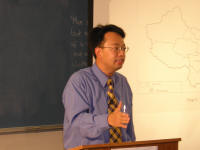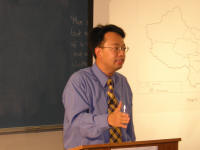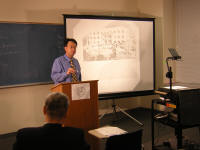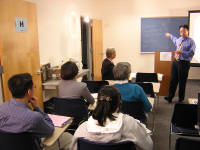This lecture is based on a book that Dr. Lee has recently published ‘The Bible and the Gun: Christianity in South China, 1860-1900’ (2003). Drawing on unpublished Chinese archival materials and ethnographic data collected by him at several Christian villages in Guangdong Province, he argues that Christianity became far more indigenous in China than has been acknowledged in the scholarly literature. In areas with absence of state control and a long history of rural violence, mass conversions were encouraged by the conviction that Christianity – through church affiliation and missionary connections – would provide external support, protection and other advantages in the violent domain of local politics.

Bible and Gun: Christianity in Modern China
Author Bio
Presented By: Joseph Tse-Hei Lee
Joseph Tse-Hei Lee is an Associate Professor of History at Pace University. Dr. Lee earned his B.A. Honors, M.A. and Ph.D. from the University of London in England.
Dr Lee is the author of The Bible and the Gun: Christianity in South China, 1860-1900 (New York and London: Routledge, 2003). He has also published numerous journal articles and book chapters on the church-state relations in modern China, Chinese diasporas in Southeast Asia, and the Sino-American relations. His most recent publications include the following:
● “Watchman Nee and the Little Flock Movement in Maoist China.” Church History: Studies in Christianity and Culture 74, no.1 (March 2005): 68-96. ● “Christianity in Contemporary China: An Update.” Journal of Church and State 49, no.2 (Spring 2007): 277-304. ● “Christianity and Chinese Diaspora in the Nineteenth Century.” In Chinese Diaspora since Admiral Zheng He, edited by Leo Suryadinata (Singapore: Chinese Heritage Centre, 2007): 247-266. ● “(Coauthored with Amy Lee) The Korean Military Brides in New York.” Inter-Asia Cultural Studies 8, no.3 (September 2007): 458-465



